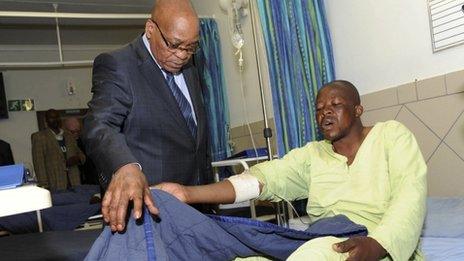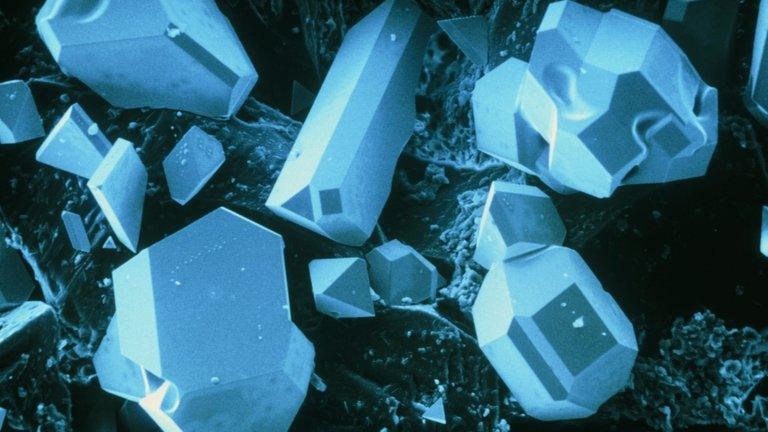Lonmin urges miners back to work after Marikana deaths
- Published
Simon Scott, finance director of Lonmin: ''Keeping public order isn't something that falls to us"
Lonmin has told workers "we need to get mining again" after staff were killed at Marikana platinum mine during clashes between police and strikers.
Some 34 people were shot dead on Thursday when police opened fire on strikers armed with clubs and machetes.
Tensions over Lonmin's relationship with rival trade unions spilled over into violent protests.
The dispute began when workers demanded a monthly pay rise from 4000-5000 rand to 12,500 (£956; $1,499).
South Africa's biggest trade union group Cosatu said: "The federation extends its condolences to the families and friends of all those who have lost their lives in this latest violence and reiterates its call for workers to observe maximum discipline and unity in the face of a ruthless attempt to divide and weaken them."
The group has convened an urgent meeting between the leadership of the National Union of Mineworkers (NUM) and a breakaway group called Natawu to address what it calls " a co-ordinated political strategy to use intimidation and violence... in a concerted drive to create breakaway 'unions' and divide and weaken the trade union movement".
Before Thursday's stand-off, 10 other people including two police officers had been killed in violence at the mine and surrounding areas.
In a statement, Lonmin chairman Roger Phillimore said: "We are treating the developments around police operations... with the utmost seriousness.
"It goes without saying that we deeply regret the further loss of life in what is clearly a public order rather than labour relations associated matter."
President Jacob Zuma has announced a commission of inquiry.
"The inquiry will enable us to get to the real cause of the incident and to derive the necessary lessons," President Zuma told reporters at a news conference.
Huge losses
Gideon du Plessis, general secretary of South African trade union Solidarity, said the country would suffer huge losses as a result of the clashes at the mine.
"South Africa's reputation as a stable investment destination is negatively affected by the violence, not only in the platinum industry but in general," he said.
On Thursday, Lonmin had said that the strike meant it would lose 15,000 ounces of platinum production, and as a result it was unlikely to meet its production forecasts for the full year.
The extent of the losses would "depend on the timing and speed with which normal operations can safely resume", the company said.
"If the industry continues to be damaged by illegal actions it is not just the economy which suffers, but all our employees, their families and dependents. We need our employees to come back to work and we need to get mining again"
Platinum is used to make electrical components, jewellery and catalytic converters in motor vehicles which reduce carbon emissions.
Mining analysts said the problems had come at an already challenging time for the industry.
"The South African platinum industry is battling not only a lacklustre platinum price, which has been subdued by the slowdown in demand for cars (and hence auto catalysts) and jewellery, but also increasing depths, declining grades and more complicated metallurgy, as production shifts to more difficult to mine reefs," said Charles Gibson, head of mining at Edison Investment Research.
Shares in Lonmin closed down 1.3% in London and ended the week down more than 10%.
Support for families
Lonmin's Chief Financial Officer, Simon Scott said the company was "committed to supporting all the families that lost loved ones during this tragic week".
It announced a number of measures to help the 34 families:
Help Desk at Lonmin's Andrew Saffy Hospital to assist families with the identification of bodies
Assistance with all burial arrangements
Bereavement counselling
Funding to cover children's education costs from primary school to university
Lonmin also stressed its work to help local communities surrounding the mine which is part of the Bushveldt complex which produces 80% of the world's platinum.
"We have invested hundreds of millions in providing housing, health services, education and also training to help local people... There is much still to be done on and around our property and we are committed to continuing this effort and investment," Mr Scott added.
- Published18 August 2012

- Published9 July 2024

- Published14 May 2012
